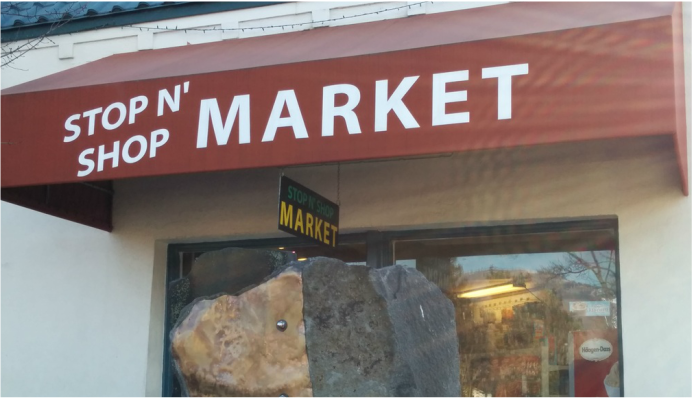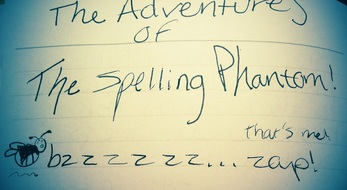Maybe the reason I love punctuation so much is that I think of each mark as a character. Well, I guess it is a “character,” technically, but I think of it as a person. A superhero or ancient god or goddess. I am constantly creating a mythology of punctuation.
So, in the interest of spreading the love of punctuation, I offer up the first installment of a series on the powers of each little mark.
The mighty apostrophe has a very specific and limited set of abilities. She is frequently misunderstood and sparks mischief in word processors all over the world in retaliation. She is rigid and unyielding, slinky and sassy as the mood strikes her. She can bring other characters together by force; she can strike them out of the text entirely if she pleases. She lives alone in a secluded cave but can frequently be seen haughtily stalking through the villages nearby.
Enough mythology; let’s look at what the apostrophe can do in the real world.
POSSESSION
If you want to say that something belongs to someone (or to something else), you might need an apostrophe (and, generally, her only friend, the letter “s”).
Eat Jim’s pizza.
The pizza belongs to Jim or originated from Jim in some way.
Note that (except in very rare circumstances, outlined in another section below) you should not use an apostrophe to make something plural. How do you know whether something is plural or possessive? Just ask yourself whether the word (or noun phrase, like "your family" in the photo below) in question could be replaced by a possessive pronoun (my, our, their, his, her, its*).
Eat his pizza.
“His” is a possessive pronoun, and the sentence still works, so “Jim’s” (with the apostrophe) is correct.
The car belongs to the Smiths.
Should “Smiths” be “Smith’s”? Well, replace "the Smiths" with a possessive pronoun. If it makes sense, add the apostrophe.
The car belongs to our.
Um, no. One Smith, two Smiths, three Smiths, four. Add “s” or “es,” not a single thing more.
(It’s tempting to add an apostrophe if the singular form of the noun already ends in “s.” But this is when to add “es” instead. Keeping up with the Joneses. Apostrophe tends to get angry if you mistreat her by using her to make plurals.)
Sometimes you need to make something both plural and possessive. Do it in that order. Add “s” or “es.” Then add the apostrophe.
The Smiths’ car.
*Understandably, “its” confuses many. Just remember that there are two different words: its and it’s. The first is a possessive pronoun. The second is a contraction.
So, in the interest of spreading the love of punctuation, I offer up the first installment of a series on the powers of each little mark.
The mighty apostrophe has a very specific and limited set of abilities. She is frequently misunderstood and sparks mischief in word processors all over the world in retaliation. She is rigid and unyielding, slinky and sassy as the mood strikes her. She can bring other characters together by force; she can strike them out of the text entirely if she pleases. She lives alone in a secluded cave but can frequently be seen haughtily stalking through the villages nearby.
Enough mythology; let’s look at what the apostrophe can do in the real world.
POSSESSION
If you want to say that something belongs to someone (or to something else), you might need an apostrophe (and, generally, her only friend, the letter “s”).
Eat Jim’s pizza.
The pizza belongs to Jim or originated from Jim in some way.
Note that (except in very rare circumstances, outlined in another section below) you should not use an apostrophe to make something plural. How do you know whether something is plural or possessive? Just ask yourself whether the word (or noun phrase, like "your family" in the photo below) in question could be replaced by a possessive pronoun (my, our, their, his, her, its*).
Eat his pizza.
“His” is a possessive pronoun, and the sentence still works, so “Jim’s” (with the apostrophe) is correct.
The car belongs to the Smiths.
Should “Smiths” be “Smith’s”? Well, replace "the Smiths" with a possessive pronoun. If it makes sense, add the apostrophe.
The car belongs to our.
Um, no. One Smith, two Smiths, three Smiths, four. Add “s” or “es,” not a single thing more.
(It’s tempting to add an apostrophe if the singular form of the noun already ends in “s.” But this is when to add “es” instead. Keeping up with the Joneses. Apostrophe tends to get angry if you mistreat her by using her to make plurals.)
Sometimes you need to make something both plural and possessive. Do it in that order. Add “s” or “es.” Then add the apostrophe.
The Smiths’ car.
*Understandably, “its” confuses many. Just remember that there are two different words: its and it’s. The first is a possessive pronoun. The second is a contraction.
Huh? If you want people to pay a lot for something you're selling, it may help to hire a proofreader.
"Your Families" here is plural. "Your Family's" would be possessive: the treasures belonging to your family.
"Your Families" here is plural. "Your Family's" would be possessive: the treasures belonging to your family.
OMISSION
The apostrophe has the unique ability to obliterate letters, either between words (as described in the section on contractions, below) or within a single word.
An apostrophe tends to be used for omission within a single word if the writer is using slang (or, specifically, writing words the way they sound when people say them aloud).
Make ’em shout. I want to hear hootin’ and hollerin’.
The omission can come at the beginning of the word, in the middle, or at the end and can be one letter or multiple letters. There are two things to note about this apostrophe use:
1. The apostrophe should always face left. (It should gently hug the air or letter to its left.)
Always, always, always. But unfortunately for us, most word processors will automatically use that imposter, the single left quote, when you try to stick an apostrophe at the beginning of a word. There are ways around this: Use the symbol browser; set up a shortcut key; or do it the clunky way and type any letter, type the apostrophe and the rest of the word, then delete the cheat letter. This is not a concern with fonts that use a straight apostrophe.
2. An apostrophe can only be used once in a word.
There may be multiple places in a word where letters are omitted. But you should only use an apostrophe once, at the first instance of omission.
Look at the li’l cutie!
The apostrophe has the unique ability to obliterate letters, either between words (as described in the section on contractions, below) or within a single word.
An apostrophe tends to be used for omission within a single word if the writer is using slang (or, specifically, writing words the way they sound when people say them aloud).
Make ’em shout. I want to hear hootin’ and hollerin’.
The omission can come at the beginning of the word, in the middle, or at the end and can be one letter or multiple letters. There are two things to note about this apostrophe use:
1. The apostrophe should always face left. (It should gently hug the air or letter to its left.)
Always, always, always. But unfortunately for us, most word processors will automatically use that imposter, the single left quote, when you try to stick an apostrophe at the beginning of a word. There are ways around this: Use the symbol browser; set up a shortcut key; or do it the clunky way and type any letter, type the apostrophe and the rest of the word, then delete the cheat letter. This is not a concern with fonts that use a straight apostrophe.
2. An apostrophe can only be used once in a word.
There may be multiple places in a word where letters are omitted. But you should only use an apostrophe once, at the first instance of omission.
Look at the li’l cutie!
Aww, poor misplaced apostrophe. Because both the "a" and the "d" are omitted from "and," only the first omitted letter should be replaced by the apostrophe: Stop 'N Shop.
CONTRACTION
Sometimes, through either the temporary goodness of her heart or a desire for vengeance, the mighty apostrophe will use her most treasured power to combine innocent words into one. She deletes unnecessary letters who get in the way (see the section on omission, above).
This one should be quick and easy: If the word is really two words combined, use an apostrophe.
If you don’t (do not) know whether the word is really two words, try saying the sentence in a snobby accent. If that doesn’t (does not) help, consider Googling, say, “lets contraction” and see what the result is. Or just write a different sentence.
Let’s go to the park.
Let us go to the park.
It’s quiet in here.
It is quiet in here.
You’re silly.
You are silly.
I could’ve been somebody!
I could have been somebody! (Hey, now, it’s never too late.)
PLURALIZATION
Remember when I said you should not use an apostrophe to make something plural? Well, there are a couple unique snowflakes that need help in order to become plural. Apostrophe takes pity on them.
When a single letter or number needs to become plural, use an apostrophe before the “s.” This is because, in some cases, those two characters could look like a completely different word.
Computers use lots of 0’s and 1’s.
If you said 0s and 1s, that looks kinda like words that sound like “oz” and “is.” Bear with me; it’s more important for letters.
I got all A’s.
I got all As? Or, I got all as? Without obvious context, this would be super confusing.
I learned my ABCs.
There is more than one letter here, so we don’t need the apostrophe’s help to make the meaning clear.
(And there is one other instance that I won’t even mention, because it’s both arguable and confusing.)
Focus on the above four areas, and you will understand the apostrophe and her ways. She is mighty. She is misunderstood. She is crucial to the well-being of all other text. She demands respect.
Sometimes, through either the temporary goodness of her heart or a desire for vengeance, the mighty apostrophe will use her most treasured power to combine innocent words into one. She deletes unnecessary letters who get in the way (see the section on omission, above).
This one should be quick and easy: If the word is really two words combined, use an apostrophe.
If you don’t (do not) know whether the word is really two words, try saying the sentence in a snobby accent. If that doesn’t (does not) help, consider Googling, say, “lets contraction” and see what the result is. Or just write a different sentence.
Let’s go to the park.
Let us go to the park.
It’s quiet in here.
It is quiet in here.
You’re silly.
You are silly.
I could’ve been somebody!
I could have been somebody! (Hey, now, it’s never too late.)
PLURALIZATION
Remember when I said you should not use an apostrophe to make something plural? Well, there are a couple unique snowflakes that need help in order to become plural. Apostrophe takes pity on them.
When a single letter or number needs to become plural, use an apostrophe before the “s.” This is because, in some cases, those two characters could look like a completely different word.
Computers use lots of 0’s and 1’s.
If you said 0s and 1s, that looks kinda like words that sound like “oz” and “is.” Bear with me; it’s more important for letters.
I got all A’s.
I got all As? Or, I got all as? Without obvious context, this would be super confusing.
I learned my ABCs.
There is more than one letter here, so we don’t need the apostrophe’s help to make the meaning clear.
(And there is one other instance that I won’t even mention, because it’s both arguable and confusing.)
Focus on the above four areas, and you will understand the apostrophe and her ways. She is mighty. She is misunderstood. She is crucial to the well-being of all other text. She demands respect.






 RSS Feed
RSS Feed